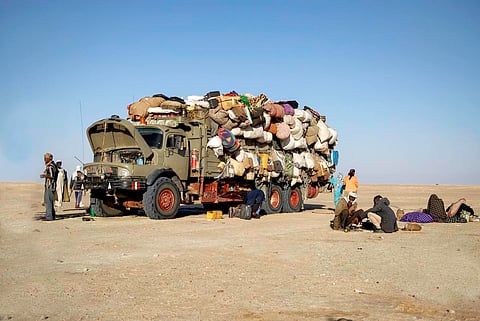

A recent report from the World Bank reveals that the inflow of refugees into Chad has significantly worsened existing vulnerabilities in the African nation.
Over the past 20 years, Chad has been affected by forced displacement resulting from ongoing conflicts in neighbouring countries such as Libya and Sudan.
The repeated waves of displacement have recently culminated in the massive refugee inflow caused by the Sudan crisis in early 2023.
The report noted that on December 11, 2023, there were 1.1 million refugees and asylum seekers in Chad, including 911,000 from Sudan, 129,000 from Central African Republic (mostly settled in the southern region), 26,000 from Cameroon (mostly settled in two camps around N’Djamena and on the banks of the Logone River), and 21,000 from Nigeria (mainly distributed in the Dar es Salaam camp and host villages in the Lake region).
If the conflict continues in 2024, more Sudanese are likely to continue fleeing out with potentially an additional 600,000 Sudanese refugees seeking asylum in neighbouring countries — including Chad.
Host populations in the border areas are marked by structural vulnerabilities, poverty, gender inequality and precarious livelihoods, says the report.
About 80 per cent of refugees and host community residents are unable to meet basic needs, compared to 42 per cent of the general population in Chad.
In terms of multidimensional poverty, refugees can be better off than their hosts due to facilitated access to education, health care and essential services, provided mainly by humanitarian and development organisations.
The report mentioned that the host populations rely on farming and herding, which are associated with diverse constraints.
Women, who head a significant portion of households in both refugee and host communities, face restrictive gender norms that limit their control over productive resources, and decision-making.
Also, trade and agriculture disruptions have exacerbated food insecurity in border areas that are most affected by the refugee influx.
In 2023, Chad was hit by severe food insecurity for the fourth consecutive year. Some 2.1 million people, about one out of ten Chadians, were acutely food insecure in 2023, 40 per cent of them in the crisis-affected eastern and southern provinces.
The report argued that almost a year since the start of the civil war in Sudan, neighbouring Chad urgently needs more humanitarian aid and significant development investment to stabilise the fragile socio-economic environment.
Additionally, shared resources are becoming increasingly scarce due to an adversely changing climate, and the inflow of refugees, has created intense pressure on and conflict around natural resources.
The negative environmental impact is widespread, leading to the depletion of resources such as firewood and foraging products. Host populations often blame refugees for the degradation of natural resources and the rising difficulties in their living conditions.
According to the report, the humanitarian needs of refugees, returnees and host communities are escalating, yet the assistance provided struggles to keep pace with the growing demands.
Out of the total required funding of $455 million for refugee response, only $151 million was secured in 2023.
This shortfall mirrors the broader funding challenges within the Chadian humanitarian response plan, which has a total requirement of $920 million, but has only reached 35 per cent of the goal.
When considering funds beyond the humanitarian response plan, Chad has received a total of $479.7 million in funding.
The World Bank report advised that to enhance social cohesion and avoid further conflicts, it is essential to develop policies and programs that benefit host communities and refugees in an integrated manner and bolster refugees’ integration through mobility.
In the short-term (1 year), policy should focus on increasing economic inclusion opportunities for refugees and host communities, issuing official ID cards for refugees, allowing them to move freely, seek formal employment, and access productive and financial assets.
In the medium-term (2-5 years), national safety nets should be expanded to include both refugees and host communities, with an emphasis on women's needs.
These measures are expected to reduce poverty and enhance self-reliance among refugees and host communities, while easing the financial pressure on the government and donors.